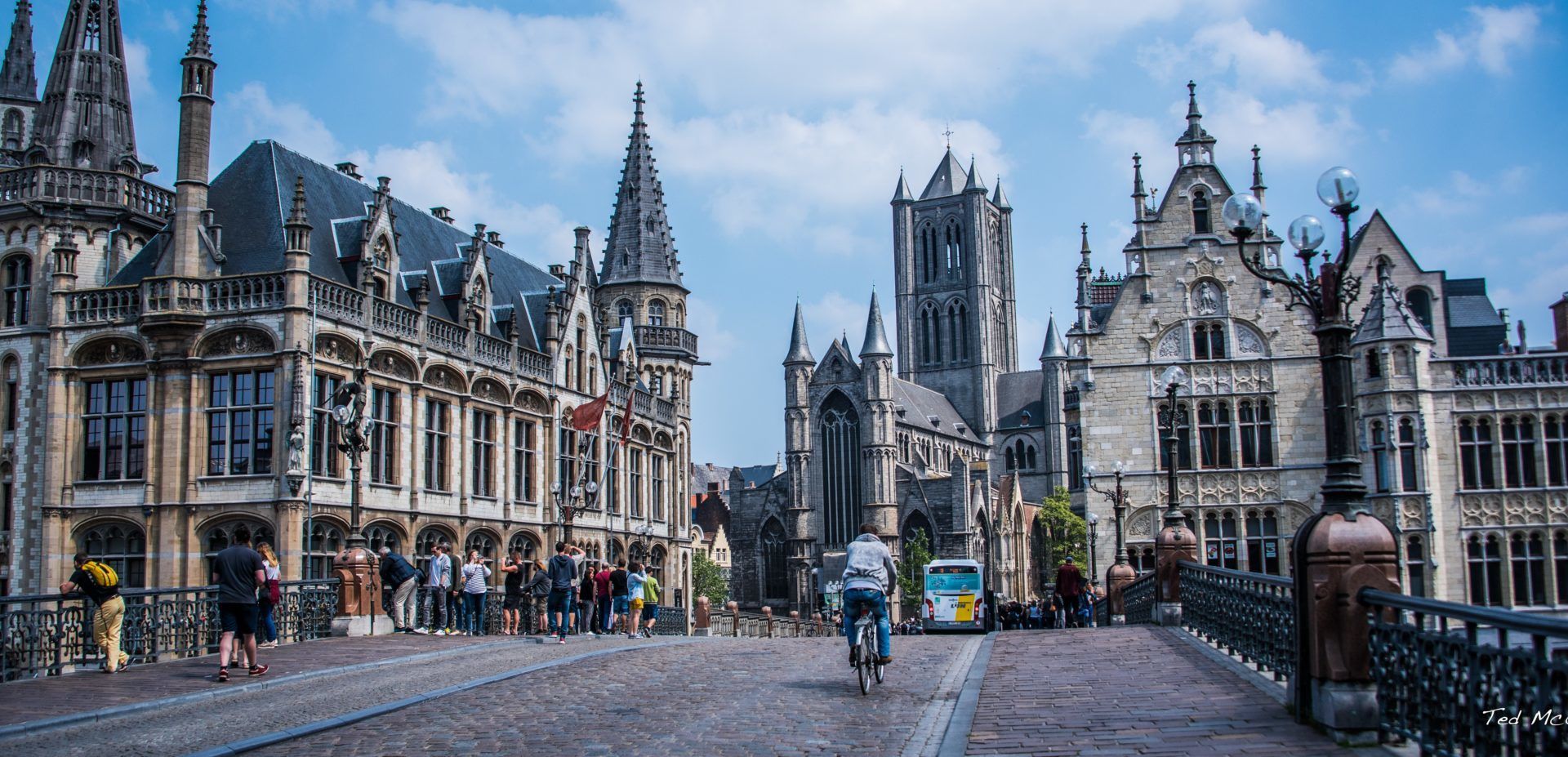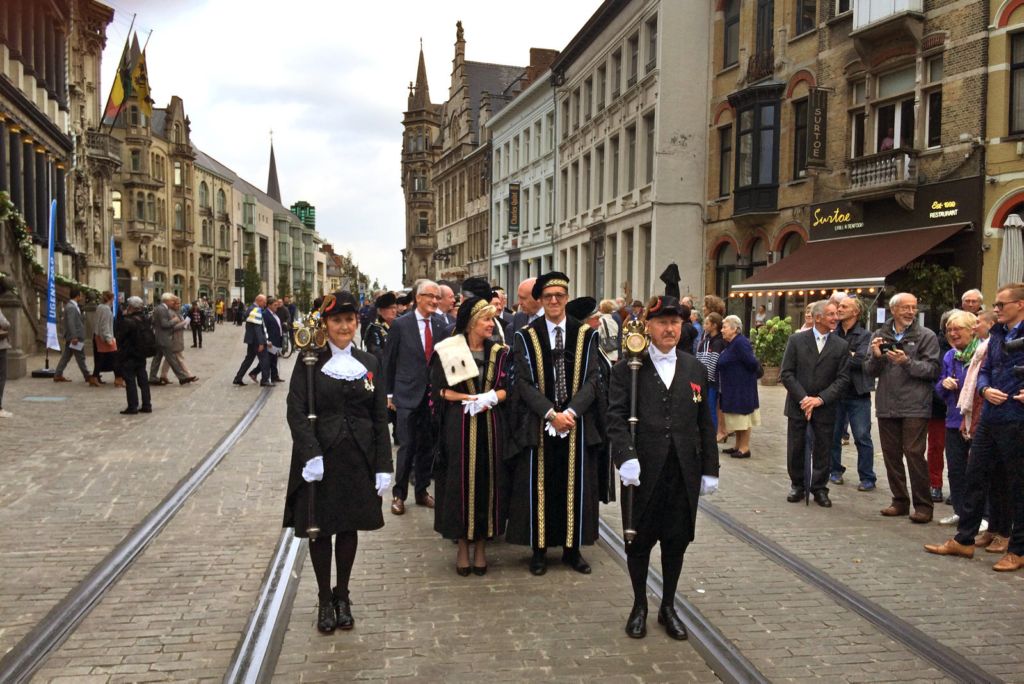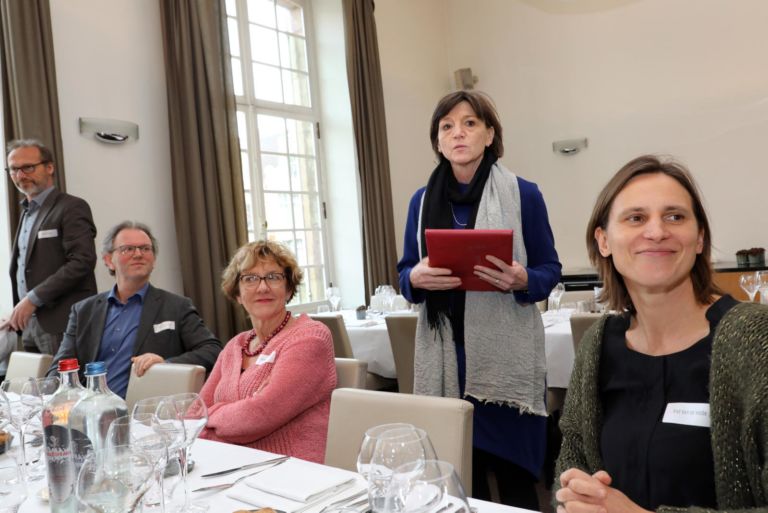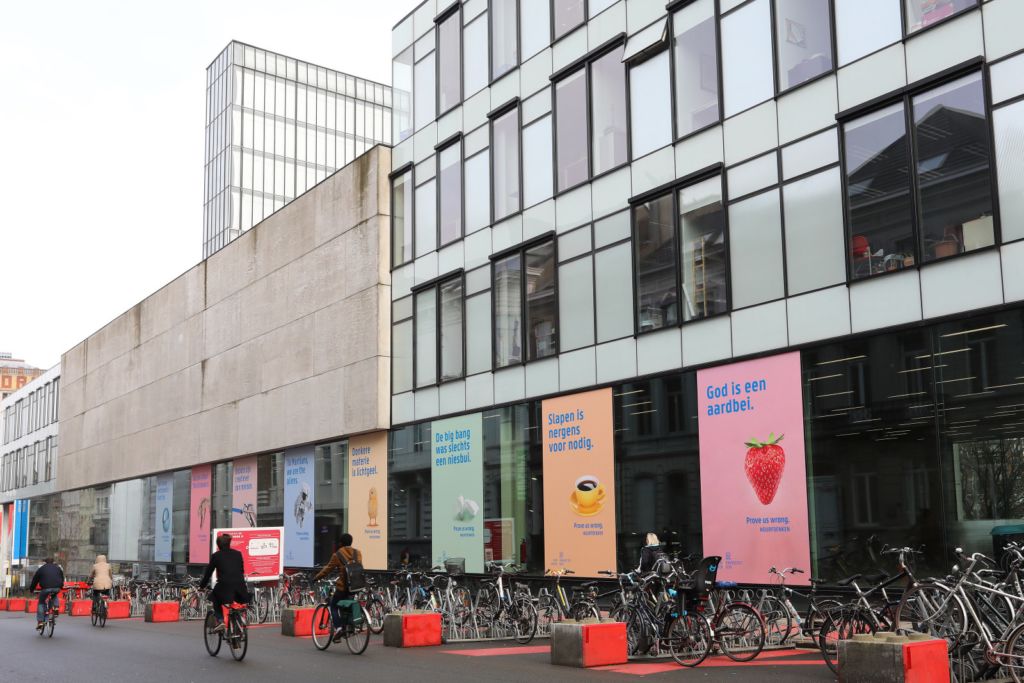All eyes on Ghent: Walhalla of free science?
-
 The city center of Gent, Belgium. Gent is a popular destination for Dutch exchange students. Photo: Ted McGrath (CC)
The city center of Gent, Belgium. Gent is a popular destination for Dutch exchange students. Photo: Ted McGrath (CC)
A university that enables its researchers to research freely without having to produce mile-long lists of publications, where the ecological footprint is really being reduced and relationships with questionable partners are held up to the light to protect human rights. Too good to be true? Ghent has it all.
After turbulent elections and no fewer than nine ballots full of politics and intrigue, Rik van de Walle was elected rector of Ghent University in 2017. Ghent University has since been constantly in the news, also in the Netherlands.
The most fundamental change of course under Van de Walle’s regime is the assessment model for researchers that he introduced. Ghent University academics are no longer being assessed for their quantifiable output, such as the number of publications and finished PhD projects. ‘Quality and the impact of research must become most important again,’ said Van de Walle when asked by Vox. ‘I want to give academics as much freedom as possible and to rid them of the idea that they are being held accountable for the relevance of their field of expertise.’
Air traffic
When it comes to sustainability and reducing the ecological footprint, there truly is a ‘Ghent model’ now. The Nijmegen Green Office, which is trying to look into ways to minimise researchers´ air traffic, does not hide the fact that it looks to Ghent for inspiration.
A third reason to look to Ghent is the human rights committee that holds its relationships with foreign universities up to the light. If a Ghent professor would like to sign a collaboration agreement with a university in Iran, Israel or Turkey, the committee gets to work to find out if these foreign institutions are guilty of human rights violations.
Three reasons for Vox to visit the rectorship of Ghent University, located in the shadow of the Vooruit Arts Centre, an art nouveau styled conference centre built more than a century ago that is the original heart of the socialist movement in the Artevelde City.
1. Ghent as champion of free science
‘Nuance’, ‘trust’, ‘doubt’. If you see these words on the wall upon entering a room, it must be the office of a university administrator. The size of the room and the large table with leather desk chairs remove any last doubts.
This is where Rector Rik van de Walle has been receiving more and more press the past couple of months. ‘And not just from Belgium, either,’ stresses the 48-year-old engineer serenely. ‘Although the Netherlands can hardly be called international, but still.’
Just like other universities, Ghent University used to assess its researchers on their quantitative output: promotions, publications, projects and acquired euros. Those who scored well on those indicators would be rewarded. Those who didn’t would pay the price.

For both researchers and universities, the academic world has become caught up in a rat race, Van de Walle claims. As is the case for Dutch universities, Ghent University must cross swords with other local universities for inherently finite funding. This system means that if you succeed, reward will follow. This also means that output increase does not automatically lead to an increase in funding: if other universities grow faster, the funding you receive may still decrease.
For a researcher, this rat race leads to practices that might not benefit quality of the research. ‘If you assess researchers on the basis of quantitative output indicators, the implicit assumption of quantity over quality is unavoidable,’ says Van de Walle. According to the Ghent rector, this causes researchers to report sooner, i.e. as soon as just enough data has been gathered to be able to publish instead of when the study is completed. ‘Or research results are split up into chunks with just enough meat to make a scientific journal.’
Academic freedom
By no longer assessing researchers by their figures, Ghent is seizing another important opportunity according to its rector. ‘I have noticed that researchers are asking themselves more and more often: is this research useful? What can it be used for? If there is no clear answer to these questions, this is often translated into: let’s stop then. Academics feel this. They are under pressure to steer their research into a subject that external parties deem useful.’
This puts pressure on academic freedom, Van de Walle observes. ‘I wish to give academics as much freedom as possible and help them get rid of the idea that they are held accountable for the relevance of their field of expertise. Any field of expertise at a university is relevant because it is a field of expertise at a university. It is as simple as that.’
‘Rankings that measure pointless indicators: how we score on them means nothing to me’
If the question ‘What will this deliver?’ is given too much importance, this according to Van de Walle will lead to the dystopian situation in which researchers are only researching subjects of which they are sure from the start that will yield outcome that can be published. Especially young researchers no longer seem to venture into what Van de Walle calls high-risk research .
‘If someone would like to pore over a derivation of a subtheorem of a mathematical theory out of sheer curiosity, this must be possible.’ According to Van de Walle, there is an important task here for the government, who should build in sufficient stability by financing through a substantial primary flow of money.
Rankings
Van de Walle is not afraid that the new policy will drop Ghent University’s position in the international rankings. ‘Rankings that measure pointless indicators: how we our score on them means nothing to me,’ says the rector bravely. ‘I couldn’t care less. There really are only two rankings that matter: the Shanghai Ranking and that of Times Higher Education. With the former, especially the research impact also plays a large role. And the latter mostly measures the reputation. Well, I believe that our new policy will be more likely to make our position rise on those rankings.’
The question remains who will benefit from the new assessment model, which no longer assesses researchers for their number of publications. Will this only be the settled professor who can rely on tenure? Or will young researchers, who have no long list of publications to their name, also reap the benefits? Van de Walle: ‘Just take a look at the most prestigious mandates that exist, the ERC Grants. The number of publications hardly plays a role for obtaining one. It simply asks for the best five publications. This career model will lead to extra time for excellent researchers to make use of their excellence. In turn, this automatically leads to publications with more impact and therefore a higher chance of funding such as the ERC Grant.’
2. Ghent as trailblazer in the field of sustainable policy
A stone’s throw from the rectorate, behind large, glass walls, resides the Ghent sustainability office – the local Green Office, so to speak. In the large building, a few students are doing some brainstorming at a scaffold table, some of them walking around on socks.
Just more than six months ago, when the university announced that it wished to reduce the air traffic behaviour of its researchers, the news flew around the world. The university asked its staff to stop flying to cities that can be reached within six hours and to consider taking the train to cities that can be reached within eight hours. Staff who still take the plane, will pay 13 EUR compensation per ton of CO2 that they cause to be emitted. ‘This is actually not enough,’ Riet van de Velde, head of the sustainability office and driving force behind the Ghent sustainability policy says. ‘The compensation should really be ten times higher. ‘

Although Van de Velde is happy with the policy on air traffic and also happy that many organisations have followed Ghent University’s example, she merely sees this as a ‘first step’ in reducing the University’s emissions. ‘15 per cent of the university’s ecological footprint consists of air traffic, which is considerable. However, the current travel policy means that we are only tackling a small portion of the total number of miles flown. Just like in the rest of society, people are flying more and more. The benefits we’re achieving by abolishing short flights will be lost by the increasing number of longer flights. Follow-up steps are in order if we wish to match the reduction of our CO2 emissions to the European objectives. Equally important in this equation are energy and mobility measures.’
The fast-speaking Van de Velde is even prouder of Ghent University’s decision to withdraw all its investments in fossil fuels. ‘Should all governments and organisations follow this example – and various parties are doing this – the transition to a fossil-free society would really speed up,’ she says. ‘And what’s more, the whole idea of the fossil divestment came from a student. The university involved him in the negotiations we were holding with our banks on the equity portfolios and he helped us a great deal with all his knowledge about the subject.’
‘We gave our banks a year to make their portfolios fossil free’
In total, Ghent University manages 240 million EUR over three portfolio administrators. ‘We gave our banks a year to make their sustainability portfolios fossil free,’ Van de Velde says. ‘The Candriam bank designed a portfolio for us especially, to meet our ambitions and is now also making it available to other clients. Negotiations are on-going with two other banks. If they do not meet our requirements, we will switch to another bank. It is slowly going our way.’
This is how the university succeeds in reducing its ecological footprint little by little. ‘Only writing sustainability reports is not going to help us achieve anything. The challenge is too large,’ says the sustainability coordinator. She says you have to ‘bundle your strength and form a coalition for each challenge in which engagement, expertise and policy are represented. We have been doing this since 2012, in a Transitie UGent thinktank. It increases support from students and staff, and pressure is applied to policy in a constructive way. Finally, strong leadership and supervision is needed. We have that in the current Executive Board.’
3. Ghent as defender of human rights
In Spring 2016, fifty Ghent University researchers wrote an open letter to Flemish newspaper De Morgen. They were against their university collaborating with Israeli organisations such as the famous Technion in Haifa, that reputedly had close relations with the Israeli army. According to the professors the collaboration is no different to being an accessory to war crimes and crimes against humanity. One of the signatories is human rights expert Eva Brems, former chair of Amnesty International and professor at Ghent University.
This powerful message was not lost on the Ghent University rector and vice-rector at the time. Their answer was to establish a human rights committee. ‘The question then was whether we could work with organisations if we know they are violating human rights,’ says Mieke Van Herreweghe, current vice-rector and committee chair sitting at a large conference table in a large office. ‘We didn’t think we could.’
Organisations that enter into an international collaboration with Ghent University must sign a clause from now on, which states that Ghent University may end the agreement in the case of serious suspicion of human rights violations. ‘Sometimes human rights are violated in a country, but the organisation has nothing to do with it,’ says Van Herreweghe. ‘That’s why we enter into collaborations with organisations, never with governments.’

PhD supervisors who suspect that a foreign university with which a collaboration is being started is violating human rights, must notify the committee. This will start an investigation and a decision to stop the collaboration may follow. The committee meets approximately every two months, decisions always have to be taken unanimously.
Van Herreweghe cannot say how many collaborations with foreign universities have been stopped. ‘Sometimes a researcher was unhappy because they missed out on an interesting collaboration, but in general, they believe human rights violations are more important than their own research.’
But of course Ghent University does not just want to point the finger. The committee’s eventual goal is to reduce the number of human rights violations. Not an easy task, the vice-rector admits. ‘In the aftermath of the alleged coup in Turkey, various Turkish universities dismissed academic Gülen sympathisers. Because these dismissals are incompatible with academic freedom, we sent these universities a letter stating that we will not be collaborating with them for the time being. ‘Who are you to lecture us?,’ was the answer from some universities. Other universities said it was indeed a problem and that they would like to change it. It means our committee has its purpose.’



